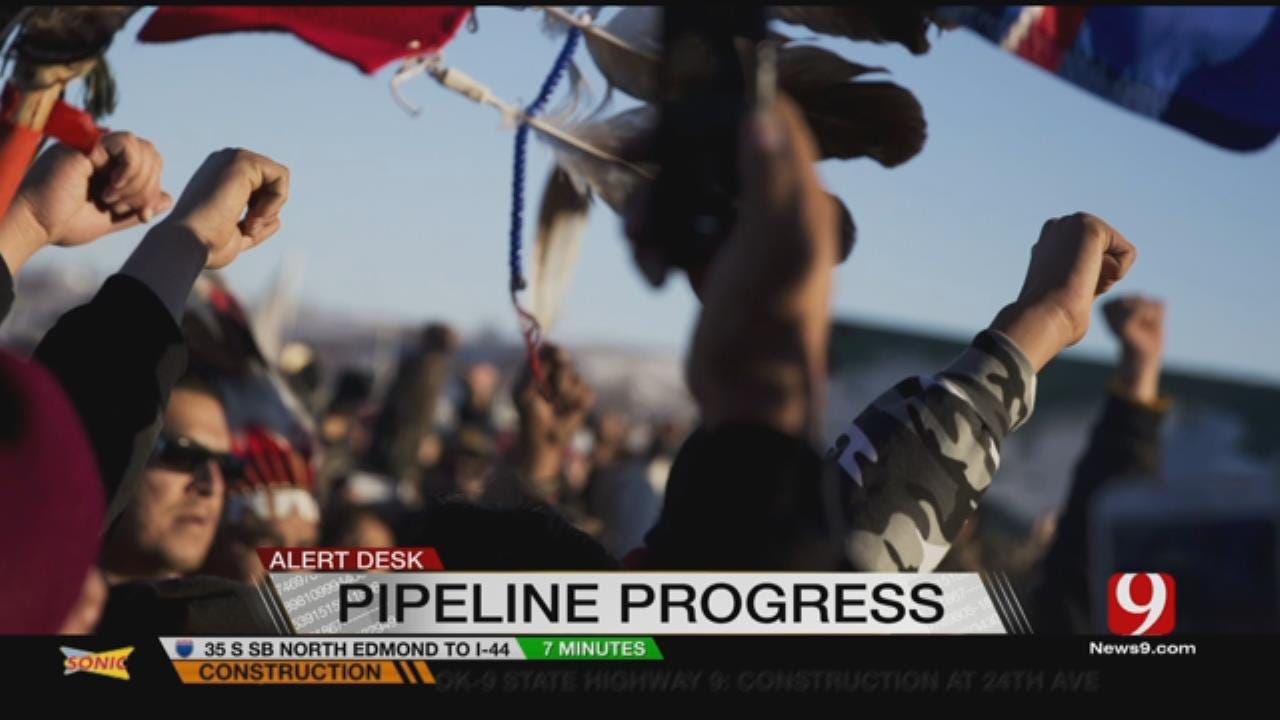Army Will Allow Completion Of Dakota Access Oil Pipeline
<p>The Army told Congress on Tuesday that it will allow the $3.8 billion Dakota Access oil pipeline to cross under a Missouri River reservoir in North Dakota, completing the disputed four-state project which has sparked multiple protests. However, construction could still be delayed because the Standing Rock Sioux tribe, which has led opposition to the pipeline, said it would fight the latest development.</p>Wednesday, February 8th 2017, 4:40 am
The Army told Congress on Tuesday that it will allow the $3.8 billion Dakota Access oil pipeline to cross under a Missouri River reservoir in North Dakota, completing the disputed four-state project which has sparked multiple protests.
However, construction could still be delayed because the Standing Rock Sioux tribe, which has led opposition to the pipeline, said it would fight the latest development.
The Army intends to allow the Lake Oahe crossing as early as Wednesday, according to court documents the Justice Department filed that include letters to members of Congress from Deputy Assistant Army Secretary Paul Cramer.
Army Public Affairs said in an email on Tuesday that the Department of the Army announced that it has “completed a presidential-directed review of the remaining easement request for the Dakota Access pipeline, and has notified Congress that it intends to grant an easement for a right-of-way across government land at Lake Oahe Dam and Reservoir, North Dakota.”
“Today’s announcement will allow for the final step, which is granting of the easement,” Robert Speer, Acting Secretary of the Army, said. “Once that it done, we will have completed all the tasks in the Presidential Memorandum of January 24, 2017.”
On Jan. 24, President Trump signed executive orders including two that would advance the Dakota Access pipeline and the Keystone XL, a pair of projects that were blocked by the Obama administration due in part to environmental concerns.
Construction of the 1,172-mile pipeline is almost complete, except for a 1,100 foot section under North Dakota’s Lake Oahe, an important reservoir on the Missouri River. The stretch is the final big chunk of work that would allow the pipeline to carry North Dakota oil through the Dakotas and Iowa to a shipping point in Illinois.
Developer Energy Transfer Partners had hoped to have oil flowing through the pipeline by the end of 2016, but construction has been stalled while the Army Corps of Engineers and the Dallas-based company battled in court over the crossing.
The Standing Rock Sioux, whose reservation is just downstream from the crossing, fears a leak would pollute its drinking water and will challenge to the Army’s decision to grant an easement, though the details were still being worked out, attorney Jan Hasselman said.
The tribe has led protests that drew hundreds and at times thousands of people who dubbed themselves “water protectors” to an encampment near the crossing. ETP says the pipeline is safe.
An assessment conducted last year determined the crossing would not have a significant impact on the environment. However, then-Assistant Army Secretary for Civil Works Jo-Ellen Darcy on Dec. 4 declined to issue permission for the crossing, saying a broader environmental study was warranted given the Standing Rock Sioux’s opposition.
ETP called Darcy’s decision politically motivated and accused then-President Barack Obama’s administration of delaying the matter until he left office. The Corps launched a study of the crossing on Jan. 18, two days before Obama left office, that could have taken up to two years to complete. Mr. Trump’s executive action on Jan. 24 told the Corps to quickly reconsider Darcy’s decision.
The court documents filed Tuesday include a proposed Federal Register notice terminating the study.
The tribe argues that under the Fort Laramie Treaties of 1851 and 1888, the federal government is obliged to consider a tribe’s welfare when making decisions that affect the tribe.
“The Obama administration correctly found that the tribe’s treaty rights needed to be respected, and that the easement should not be granted without further review and consideration of alternative crossing locations,” Hasselman said. “Trump’s reversal of that decision continues a historic pattern of broken promises to Indian Tribes and violation of treaty rights. They will be held accountable in court.”
ETP has been poised to begin drilling under Lake Oahe as soon as it has approval. Workers have drilled entry and exit holes for the crossing, and oil has been put in the pipeline leading up to the lake in anticipation of finishing the project. ETP spokeswoman Vicki Granado did not immediately respond to a request for comment on the Army’s decision.
Those protesting the pipeline at an encampment the tribe set up on federal land have at times clashed with police, leading to nearly 700 arrests. The camp’s population thinned to fewer than 300 as harsh winter weather arrived and as Standing Rock officials pleaded for the camp to disband before the spring flooding season.
© 2017 CBS Interactive Inc. All Rights Reserved. This material may not be published, broadcast, rewritten, or redistributed. The Associated Press contributed to this report.
More Like This
February 8th, 2017
March 22nd, 2024
March 14th, 2024
February 9th, 2024
Top Headlines
April 19th, 2024











